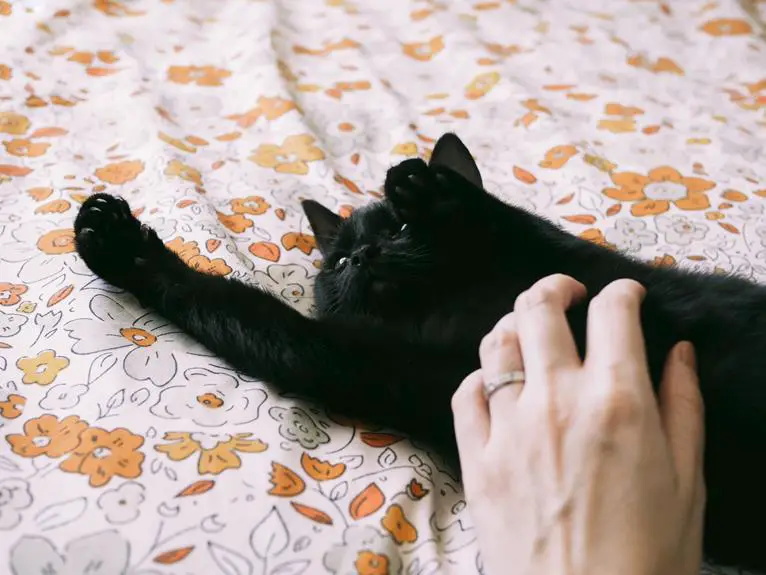Caring for a constipated kitten can be a challenging and daunting task. But don’t worry, you’re not alone. According to the American Society for the Prevention of Cruelty to Animals, constipation is a common issue in kittens and can be easily treated.

With this purr-fect guide, you’ll be able to provide expert-level relief for your constipated kitten. Compassionate, knowledgeable, and detailed, you’ll learn the signs, prevention, and treatments to help your kitten feel better.
Table of Contents
How to Help a Constipated Kitten: Key Takeaways
- Kitten constipation can be caused by factors such as dehydration, lack of dietary fiber, stress, gastrointestinal obstruction, and intestinal worms.
- Treatment options for kitten constipation range from outpatient medications to surgical interventions, depending on the severity of the condition.
- Home remedies for kitten constipation include increasing water intake, adding fiber to the diet, encouraging exercise, and seeking veterinary attention if constipation persists.
- Prevention of kitten constipation involves providing a balanced diet with adequate fiber, regular exercise, minimizing stress, and regular veterinary check-ups.
What Is Kitten Constipation
You may be wondering what exactly is kitten constipation and what causes it.
Kitten constipation is a condition in which a kitten is unable to pass stool or has difficulty passing stool.
It can be caused by dehydration, lack of fiber in the diet, or a blockage in the intestines from foreign objects.
It can also be caused by an infection or underlying medical condition.
Symptoms of constipation include infrequent or no bowel movements, straining or crying while in the litter box, and hard, dry, or small stools.
If your cat is constipated, it’s important to take them to a veterinarian for a proper diagnosis and treatment plan.
To prevent constipation, ensure your kitten has access to plenty of fresh water and a fiber-rich diet.
Regular exercise and playtime can also help keep your cat’s digestive system functioning properly.
Symptoms and Causes of Kitten Constipation
You may be wondering what exactly are the symptoms and causes of kitten constipation.
Constipated kittens may exhibit a lack of bowel movements, vomiting, lethargy, loss of appetite, and a tendency to hide. Other signs include difficulty jumping, stiff movements, and entering and exiting the litter box multiple times before going. Firm or dry stools can also indicate constipation.
If your kitten is experiencing any of these symptoms, it’s important to seek veterinary care.
Dehydration, ingestion of foreign objects, lack of stimulation, and heavy intestinal parasite burdens can all lead to constipation.
To prevent constipation, ensure adequate hydration, and regular deworming, provide a balanced diet of both dry and wet kitten food with canned pumpkin, and keep an eye out for potential obstructions. Home remedies such as increased water intake and fiber supplements can also be used.
In severe cases, manual removal of intestinal obstruction or surgery may be necessary. If home remedies fail, seek professional help from a trusted veterinary clinic.
Prevention and Treatment of Kitten Constipation
You can prevent and treat constipation in kittens by providing a balanced diet, plenty of water, and regular exercise. A mother cat encourages urination and defecation in newborn kittens, but if stimulation doesn’t work, veterinary assistance is necessary.
Hairballs can also lead to constipation, so regular brushing is important for cats with long hair. Keeping the litter box area inviting and comfortable can help solve constipation issues, as cats are sensitive to sound and movement.
Increasing water intake by providing fresh water and moistening food can also help. Adding fiber to the diet through pumpkin or psyllium husk can help too. If symptoms persist, seek veterinary attention to rule out other medical conditions.
Creating an Inviting Litter Box Area
You can help create an inviting litter box area for a constipated kitten by placing it in a safe and secluded location. Cats are sensitive to sound and movement, so keep them away from busy areas.
You can also place multiple litter boxes throughout the house to encourage your cat to use them. Using super-absorbent cat food and litter can reduce odor and make the litter box more appealing.
If your kitten is still not using the litter box, you can try different types of litter. This can help stimulate the kitten to poop. Additionally, providing a comfortable and inviting litter box experience can help with constipation issues.
If you’re unsure, consult your veterinarian. They can provide advice and guidance on how to care for your cat’s health and help to identify any underlying causes of constipation.
Dietary Changes to Help With Constipation
By introducing more fiber to your kitten’s diet, you can help with constipation. Adding soluble fiber to the food can help make the feces softer and easier to pass. Try adding carrots, pumpkin, and rice to the diet to provide more fiber.
If your kitten is constipated, it’s important to keep them hydrated. Increase their fluid intake by providing fresh water and moistening food with warm water. You can also try adding probiotic-rich foods to regulate gut and intestine health.
It’s also important to consult a vet for medication if the constipation persists or if there are other medical issues. With the right nutrition and medicine, you can help your kitten stay healthy and active.
Frequently Asked Questions
What Is the Best Way to Administer Laxatives to Kittens?
When administering laxatives to kittens, always consult a veterinarian. Ask about the best dosage and type of laxative for your pet, as well as any potential side effects. Offer the laxative in a palatable form and monitor the kitten closely for any adverse reactions.
How Often Should Kittens Be Dewormed?
For optimal health, kittens should be dewormed every three months. Imagery of a happy, healthy kitty can help you envision the importance of regular deworming. With compassionate care, you can ensure your kitten’s well-being and give it a purr-fect life!
What Are Signs of Dehydration in Kittens?
Signs of dehydration in kittens include sunken eyes, dry gums, lethargy, and loss of skin elasticity. If you notice any of these symptoms, provide your kitten with ample water and seek immediate veterinary attention.
Is It Normal for Kittens to Have a Different Bowel Movement Schedule Than Adult Cats?
Yes, it’s normal for kittens to have a different bowel movement schedule than adult cats. Visualize a tiny newborn, still learning how to use their tiny bodies. Offer them patience, plenty of water, and a fiber-rich diet to help encourage healthy bowel movements.
How Can I Tell if My Kitten Is Constipated or Has Another Medical Condition?
If your kitten isn’t pooping regularly, straining or crying while trying, or has hard, dry stool, it may be constipated. Look out for other signs such as bloating, lethargy, and loss of appetite. If symptoms persist, seek veterinary help to rule out other medical conditions.
My name is Ben and I am a cat lover. I’m not a professional writer or a doctor or an expert of any kind on anything. But I am a guy who likes to share what little knowledge and experience I have with others.
